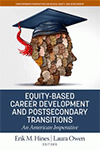
Equity-Based Career Development and Postsecondary Transitions
An American Imperative
Edited by:
Erik M. Hines, Florida State University
Laura Owen, San Diego State University
A volume in the series: Contemporary Perspectives on Access, Equity, and Achievement. Editor(s): Chance W. Lewis, University of North Carolina at Charlotte.
Published 2022
Former First Lady, Michelle Obama believes that every individual should have some type of postsecondary education or training beyond high school to achieve economic and personal success (Reach Higher Initiative, Better Make Room, 2019). Educational attainment (e.g., a high school diploma, college degree, or postsecondary training) provides career opportunities for advancement into leadership positions and benefits such as health insurance and retirement (Heckman, 2000). Additionally, an individual with a college degree can make over one million dollars more over a lifetime in salary than someone with a high school diploma (Carnevale, Cheah, & Hanson, 2015). Acquiring a college degree can lead to employment opportunities and is considered an asset in the U.S. economy (Washington, 2010). However, certain populations encounter barriers to attaining an education, particularly a postsecondary education, leading to a disparity in receiving the aforementioned benefits. Some of these populations include African American students, LGBTQ students, and students with disabilities. There is a dearth of information and research on providing guidance on implementation, research, and best practices in equity-based career development, college readiness, and successful postsecondary transitions for minoritized, at risk, or vulnerable populations.
The editors of this volume invited authors with research and practice expertise around various student populations in preparing them for college and career readiness as well as postsecondary transitions. This book is the first of its kind to discuss career development and postsecondary transitions from an access and equity perspective. Further, this text serves as a call to action to ensure the United States’ most vulnerable populations has an opportunity to successfully transition into multiple postsecondary options after high school.
CONTENTS
Foreword, James L. Moore, III. Acknowledgment. Advocating for School Counselors’ Role in Students’ Career Development and Postsecondary Transitions, Mary Edwin and Diandra J. Prescod. Using Data and Accountability Strategies to Close College and Career Readiness Gaps, Anita A. Young and Ileana Gonzalez. School Counselors as Leaders: Best Practices for Developing Postsecondary Readiness Programming, E. C. M. Mason, Carla B. Cheatham, Beth H. Gilfillan, Bobby B. Gueh, H. Brent Henderson, and Adrianne Robertson. Preparing Students for Uncertain Futures: The Role of College Knowledge and Student Preferences for Receiving College and Career Information, Timothy A. Poynton and Laura Owen. Using Equity-Focused School–Family–Community Partnerships to Enhance Career Development and Postsecondary Transitions for Students of Color, Mary Edwin, Latoya Haynes-Thoby, and Julia Bryan. Serving Native American Children and Families: Considering Cultural Variables, Carol Robinson-Zañartu. Factors Impacting Postsecondary Transitions for Black Students, Erik M. Hines, Mia R. Hines, Bobbi-Jo Wathen, Paul Singleton II, Sophia L. Ángeles, Tyron Slack, and Damian Brown Jr. Culturally Responsive Postsecondary Advising for Latinx Students, Diana Camilo and Robert Martinez. School Psychologist and School Counselor Collaboration to Support the College and Career Readiness of Immigrant and Refugee Youth, Desireé Vega, Jaclyn N. Wolf, Marie L. Tanaka, César D. Villalobos, and Ayanna C. Troutman. Facilitating Career and College Readiness for Students With Disabilities, Amy Milsom and Allyson Murphy. “We Need Support Too”: College and Career Readiness Needs of Gifted Students, Renae D. Mayes, Lia D. Falco, Alyssa F. Begay, and Cassandra L. Hirdes. Preparing LGBTQ+ Students for Postsecondary Transitions Through Career Development, Eunhui Yoon, Michael Morgan Jr., and Viola May. Black Student Athletes: Readiness Versus Eligibility, Paul C. Harris, Joseph M. Williams, Chauncey Smith, Miray D. Seward, Liana Elopre, Ellie C. Wengert, and Joshua Rauguth. Meeting the Unique Needs of First-Generation College Students: An Exploration of Psychosocial Theory, Postsecondary Transition, and Career Development, Jonique R. Childs, Jennifer Sánchez, and Grace W. Wambu. Using Hip-Hop Practices to Foster College and Career Readiness, Ian P. Levy, Justis Lopez, and Erik M. Hines. The Role of the School Counselor in Creating Equitable Opportunities Postsecondary Success Through Self-Awareness, Career Exploration, and Academic Rigor, Clifford Mack Jr., Laura J. Cohen, and Randi Schietz. Equity-Based Career Development as an Integral Component of a Comprehensive School Counseling Program, Julie A. Cerrito and Richard Joseph Behun. Equity-Focused Group Counseling Strategies: Preparing African American Males for Their First Year in College, Sam Steen, Dantavious Hicks, and Norma L. Day-Vines. Career Academies as an Exemplary Model of Preparing Students of Color to be College and Career Ready, Edward C. Fletcher Jr. Afterword, Cheryl Holcomb-McCoy. About the Contributors.
-
Paperback978-1-64802-865-6
Web price: $62.04 (Reg. 72.99)
-
Hardcover978-1-64802-866-3
Web price: $89.24 (Reg. 104.99)
- eBook978-1-64802-867-0

- EDU046000 - EDUCATION: Professional Development
- EDU031000 - EDUCATION: COUNSELING: Career Guidance
- EDU037000 - EDUCATION: Research
-
 Advancing Inclusive Excellence in Higher Education
Practical Approaches to Promoting Diversity, Equity, Inclusion, and Belonging
Advancing Inclusive Excellence in Higher Education
Practical Approaches to Promoting Diversity, Equity, Inclusion, and Belonging
-
 Developing Culturally Responsive Learning Environments in Postsecondary Education
Developing Culturally Responsive Learning Environments in Postsecondary Education
-
 Economic, Political and Legal Solutions to Critical Issues in Urban Education and Implications for Teacher Preparation
Economic, Political and Legal Solutions to Critical Issues in Urban Education and Implications for Teacher Preparation
-
 Imagining the Future
Historically Black Colleges and Universities - A Matter of Survival
Imagining the Future
Historically Black Colleges and Universities - A Matter of Survival
-
 Post-Secondary Planning for All
Approaches to College and Career Readiness Counseling for Special Populations
Post-Secondary Planning for All
Approaches to College and Career Readiness Counseling for Special Populations
-
 Preparing to Lead
Narratives of Aspiring School Leaders in a "Post"-COVID World
Preparing to Lead
Narratives of Aspiring School Leaders in a "Post"-COVID World
-
 Unveiling the Cloak of Invisibility
Why Black Males are Absent in STEM Disciplines
Unveiling the Cloak of Invisibility
Why Black Males are Absent in STEM Disciplines

